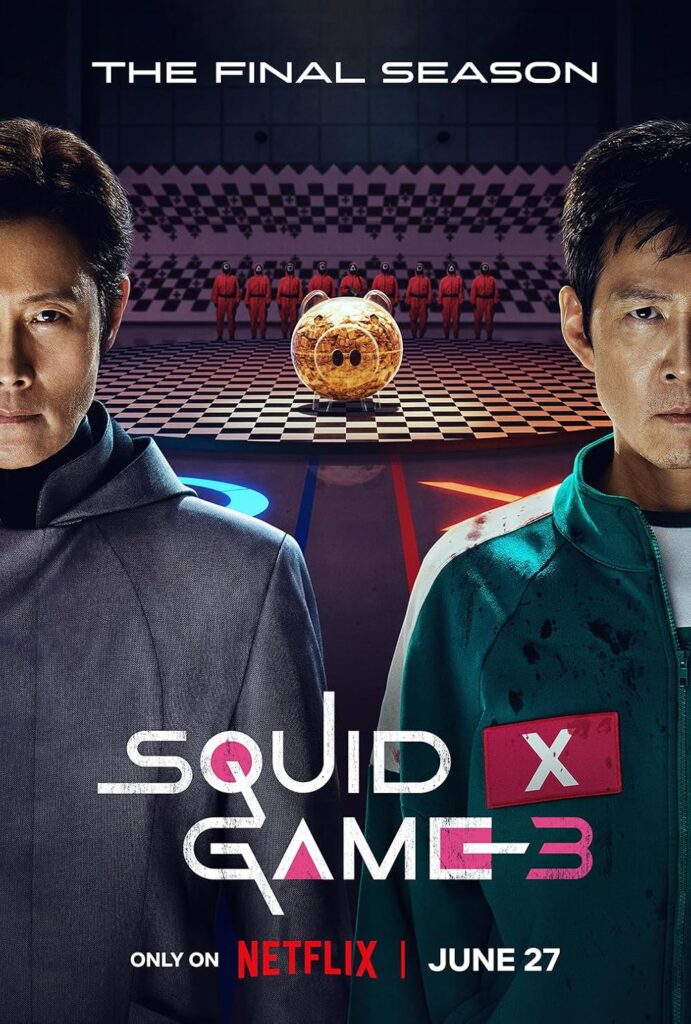A Korean Series That Shook the World
When Squid Game premiered in 2021, its global success surprised audiences and industry insiders alike. Season 1 quickly became a Netflix sensation, blending childhood games with a harrowing survival narrative. It exposed deep themes of inequality, debt, and desperation. More than just entertainment, it resonated globally as a powerful social allegory.
The series went on to earn six Emmy Awards, with Lee Jung-jae becoming the first Asian actor to win Outstanding Lead Actor in a drama. Many critics praised the show’s minimalist visuals, emotional storytelling, and its biting critique of modern society.
The show earned six Emmy Awards, with Lee Jung-jae becoming the first Asian actor to win Outstanding Lead Actor in a drama. Critics praised the series’ blend of visual minimalism, emotional storytelling, and piercing critique of modern society.

Season 1: Survival, Strategy, and Social Decay
Season 1 worked because it was tightly constructed and thematically rich. It drew viewers into simple games—Red Light, Green Light; Tug of War; Marbles—that unfolded into complex moral choices. These scenarios mirrored real-world dynamics of class division, exploitation, and psychological warfare.
At its core, the show was a game-theoretic masterpiece. Each round forced characters to weigh trust against self-interest, sacrifice against survival.
- The marble game represented the prisoner’s dilemma.
- The tug-of-war battle became a lesson in coalition strategy.
- The final game exposed the ultimate price of winning under corrupt systems.
Its power lay in how strategically human behavior was framed within life-or-death stakes—which is why some argue Season 1 should have been the end.
Did Squid Game Really Need Seasons 2 and 3?
After the perfection of Season 1, Seasons 2 and 3 were met with mixed reactions, especially in Korea.
Korean dramas are typically self-contained, and for many viewers, the original series had already said everything it needed to say.
Season 2, released in 2024, broadened the story’s perspective. Gi-hun returned not as a player, but as a man seeking justice from within the system. Meanwhile, Season 3, which aired in mid-2025, brought the emotional climax of Gi-hun’s ultimate act of self-sacrifice.
Though ambitious in scale and theme, some critics argued that the sequels lacked the raw intensity and thematic precision of the original. The concept that was once laser-focused became, at times, narratively diluted.
What Could Have Been: Global Collaboration and Creative Expansion
One way Squid Game might have maintained its momentum was through collaborative storytelling models.
Shows like Stranger Things or The Last of Us succeeded over multiple seasons by leveraging writers’ rooms, diverse perspectives, and international consultants.
If Squid Game had included:
- Game theorists to deepen strategic logic
- Sociologists to guide systemic world-building
- Global screenwriters to add fresh moral tensions
…the series could have evolved from a sharp allegory into a layered cultural mythology.
Instead, the later seasons, though impressive in production, felt limited by the vision of a single creator trying to extend a closed loop.
Global Success by the Numbers
Across its three seasons, Squid Game consistently delivered staggering global performance.
Season 1 became a cultural landmark, reaching 142 million households and logging 1.65 billion hours viewed in just four weeks—Netflix’s highest ever at the time.
Season 2, released in 2024, followed strongly with 68 million views in four days, ranking #1 in 92 countries.
Season 3 maintained the momentum with 60.1 million views and 368 million viewing hours within just three days, setting a new record for Netflix’s largest TV launch to date.
Despite mixed critical responses in later seasons, Squid Game demonstrated enduring global appeal and audience loyalty, firmly establishing itself as one of the most impactful series in streaming history.

The Legacy of Squid Game
Despite receiving some critical feedback, Squid Game has cemented its place as a defining cultural work of the 2020s. It proved that Korean storytelling can captivate the world, not through mimicry, but through bold and authentic voices.
Its impact will outlast any debate over sequel quality:
- It showed that K-drama can be dark, smart, and globally resonant.
- It legitimized Korean cultural exports as powerful tools of soft power.
- And it opened the door for future works to dream bigger—and collaborate wider.
Squid Game may have started as a deathmatch for desperate individuals, but it ended as a mirror reflecting the systems we all live in.
If Season 1 asked “What would you do to survive?”,
then Season 3 leaves us asking: “What are we willing to change to live with dignity?”